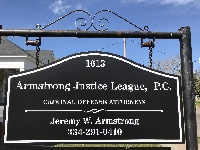Hatchechubbee White Collar Crime Lawyer, Alabama
Sponsored Law Firm
-
 x
x

Click For More Info:
-
The Law Offices of Richard L. Cooper, P.A.
848 Brickell Avenue Suite 800 Miami, FL 33131» view mapDWI/DUI, Drug Trafficking, Felony Nationally Ranked Top 40 Under 40
With Richard L. Cooper you can expect a trusted confidant who will work diligently to fully understand your case and determine a road map to help you regain control of your life.
800-756-2781
Not enough matches for Hatchechubbee White Collar Crime lawyer.
Below are all Hatchechubbee Criminal lawyers.
Jeremy W. Armstrong
✓ VERIFIEDCriminal, Felony, Misdemeanor, DUI-DWI, State Appellate Practice
"A Criminal & D.U.I. Defense Law Firm"
I have spent my entire legal career in the criminal justice system as a former prosecutor and a criminal defense attorney since October 2000. In Apri... (more)
Connie Jo Cooper
Wills & Probate, Divorce & Family Law, Criminal, Medical Malpractice
Status: In Good Standing Licensed: 32 Years
FREE CONSULTATION
CONTACTJames Robert Mckoon
Divorce & Family Law, Criminal, Personal Injury, Accident & Injury
Status: In Good Standing Licensed: 47 Years
Ralph Michael Raiford
Accident & Injury, Criminal, Estate, Traffic
Status: In Good Standing Licensed: 46 Years
Ben Elton Bruner
Criminal, Immigration, Agriculture, White Collar Crime
Status: In Good Standing Licensed: 40 Years
Brandon M Daniels
Divorce, Divorce & Family Law, DUI-DWI, Criminal
Status: In Good Standing Licensed: 17 Years
Charles Eddie Floyd
Social Security, Workers' Compensation, Criminal, Slip & Fall Accident, Accident & Injury
Status: In Good Standing Licensed: 53 Years
Eric Barbee Funderburk
Family Law, Divorce & Family Law, Criminal, Bankruptcy & Debt
Status: In Good Standing Licensed: 29 Years

 Richard L. Cooper Miami, FL
Richard L. Cooper Miami, FL AboutMiami Attorney at Law
AboutMiami Attorney at Law ServicesCriminal Defense
ServicesCriminal Defense

